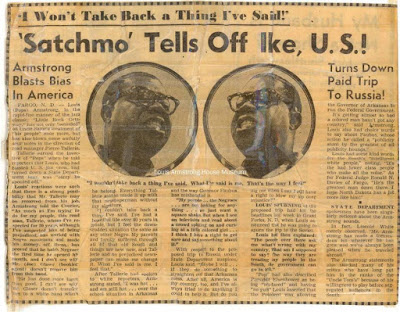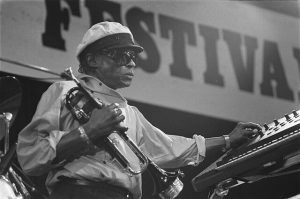Interview with Al Jackson
Download the mp3 here
Click here to help grow Treme’s Petit Jazz Museum
Test your knowledge of jazz history
True or false
#1 – Louis Armstrong was born on August 4, 1901 not July 1, 1900 as he and his mother said – and there is conclusive documentary evidence that establishes the August 4th date.
FALSE
There is no valid documentary evidence that proves a birth date other than the one Armstrong and his mother claimed: July 4, 1900.
The document that supposedly “proves” his birth as being on August 4th is literally nothing more than a scrap of paper without provenance. It’s certainly not an official birth certificate or baptismal certificate.
Further, the idea that Louis Armstrong, a poor black child, would have been baptized at an all white Catholic Church in Mid-City (Sacred Heart of Jesus) during a period of strict segregation is far-fetched in the extreme.
It would be like boxer Mike Tyson, another young black boy born into difficult circumstances, being baptized at St. Patrick’s Cathedral.
#2 – After he moved to Chicago in 1922, Armstrong virtually stopped coming to New Orleans, essentially boycotting the city for the rest of his life.
FALSE
The official ledger of the black musicians union in New Orleans – of which Armstrong was a member – clearly records that he performed at least 14 times in New Orleans during a period “historians” say he boycotted the city.
Where did he perform? At black-only clubs, this at a time when audiences were racially segregated by law.
(Ask Dr. John how many times as a young man he was arrested and taken to jail in handcuffs for performing with black musicians at the Dew Drop Inn.)
#3 It’s certain and proven that Louis Armstrong’s mother worked as a prostitute.
FALSE
There is no documentary evidence of any kind that establishes that Armstrong’s mother worked in any “crib” or brothel or as a prostitute
The record only shows that she lived for a while in a rooming house in a “bad section” of town, one of the few housing options available to low income blacks in that city at that time. The assertion that her exact profession is known is based on nothing more than a guess by “historians”
Louis Armstrong, Little Rock, and Eisenhower

On September 29, 1957, about ten days after he put his career on the line by publicly denouncing Eisenhower for failing to provide protection to black school children threatened by racist mobs in in Little Rock, Arkansas, Armstrong appeared on the DuPont Show of the Week called “Crescendo.”
At the 1:05 mark, he looks heavenward and quotes “The Star Spangled Banner” briefly – a tune he had pointedly stopped playing publicly.
I recommend you watch this clip a couple of times so that you can see what I see in it:
Armstrong is praying for his country’s soul.
In between Armstrong’s very strongly worded public comments and this performance, on September 26 Eisenhower finally sent US troops to Little Rock to make sure black students there could enter their school safely.
Click here to help grow Treme’s Petit Jazz Museum
– Ken McCarthy
Jazz on the Tube
Music credit: The Jazz on the Tube podcast theme song is “Mambo Inferno” performed by The Manhattan School of Music Afro-Cuban Jazz Orchestra conducted by Bobby Sanabria from the CD ¡Que Viva Harlem!







